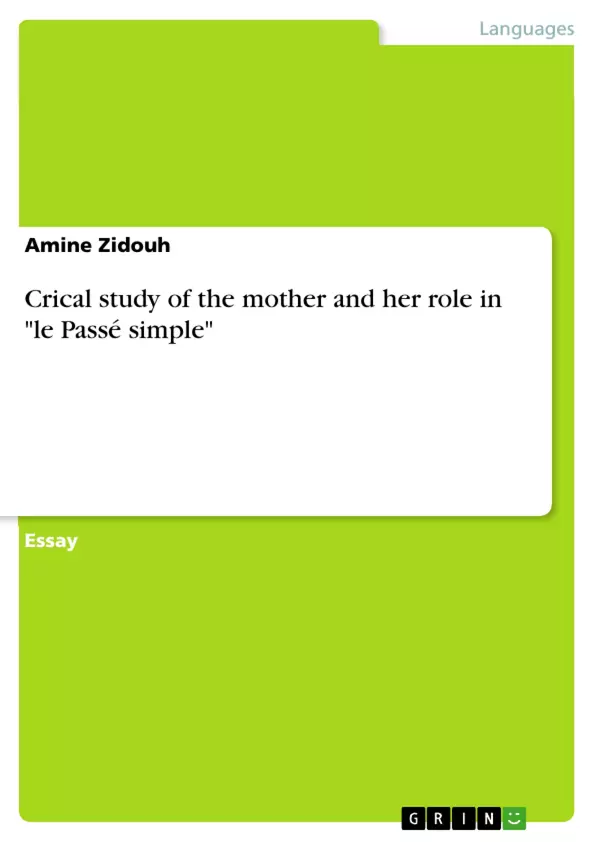In opposition to “Le Seigneur” in Le Passé Simple, who is depicted to be a god-like figure; a representation of power in all its forms, we find the mother, who throughout the novel is only referred to by her social role “mother” as a sign of total lack of identity. Weak, obedient, fearful, to cite only a few adjectives that the mother was qualified with, she appears to be totally transparent in the family circle and in addition to being the subject of “Le Seigneur’s” tyranny, she is also confronted to her son‟s amour-propre.
Inhaltsverzeichnis (Table of Contents)
- Introduction
- The Mother: A Lack of Identity
- Driss's Negative Representation of the Mother
- The Mother as a Housewife
- The Mother's Suffering and Awareness
- Driss's Violent Words towards the Mother
- The Mother's Disappointment in Driss's Rebellion
- The Mother's Suicide: An Act of Dignity
- A Psychoanalytical Perspective on the Mother's Death
- The Mother's Impact on Driss's Rebellion
Zielsetzung und Themenschwerpunkte (Objectives and Key Themes)
This analysis aims to critically examine the portrayal of the mother in Driss Chraïbi's novel, "Le Passé Simple," focusing on her role and significance within the narrative. The analysis explores themes of identity, power, rebellion, and social roles.- The Mother's Lack of Identity
- Driss's Negative Representation of the Mother
- The Mother's Suffering and Awareness
- The Mother's Suicide as a Symbol of Dignity
- The Mother's Influence on Driss's Rebellion
Zusammenfassung der Kapitel (Chapter Summaries)
The analysis begins by establishing the mother's lack of identity in the novel, where she is solely defined by her social role. Driss, the narrator, presents a negative view of his mother, portraying her as weak, submissive, and passive. He sees her as a birth machine, emphasizing her failure to fully fulfill the role of a mother. The analysis then explores the mother's role as a housewife, confined to the domestic sphere and subject to her husband's tyranny. The analysis highlights the mother's awareness of her suffering and her desire to reclaim her dignity, despite being unable to actively rebel. Driss's harsh and disrespectful words toward his mother reflect the complex dynamics of their relationship. The mother's disappointment in Driss's rebellion underscores her sense of powerlessness in the face of her husband's dominance. The analysis explores the significance of the mother's suicide as an act of defiance, a way to reclaim her agency and assert her dignity. The mother's death is also interpreted from a psychoanalytical perspective, suggesting a detachment from the "mother image" that allows Driss to engage in his own rebellion. Finally, the analysis examines the impact of the mother's death on Driss's rebellion. The mother is perceived as an obstacle to Driss's rebellion, and her death removes this barrier, enabling him to confront the symbolic power of "Le Seigneur."Schlüsselwörter (Keywords)
The main keywords and concepts of the text include: "Le Passé Simple," Driss Chraïbi, the mother, identity, power, rebellion, social roles, housewife, suffering, dignity, suicide, psychoanalysis, Oedipus complex, "Le Seigneur." The analysis focuses on the complex relationship between the mother and her son, Driss, and the impact of their respective roles and struggles on the larger themes of the novel.Frequently Asked Questions
How is the mother depicted in "Le Passé simple"?
The mother is depicted as a figure lacking identity, referred to only by her social role, and characterized as weak, obedient, and submissive.
What does the mother's suicide symbolize?
Her suicide is interpreted as an act of dignity and defiance, a way to reclaim her agency from her husband's tyranny.
How does Driss view his mother?
Driss, the narrator, has a complex and often negative view, seeing her as a "birth machine" and expressing violent words towards her during his rebellion.
What role does "Le Seigneur" play in the family?
"Le Seigneur" is the father figure representing absolute power and tyranny, to which the mother is completely subject.
How does the mother's death impact Driss's rebellion?
From a psychoanalytical perspective, her death removes a symbolic barrier, allowing Driss to fully confront his father's power.
- Arbeit zitieren
- Amine Zidouh (Autor:in), 2012, Crical study of the mother and her role in "le Passé simple", München, GRIN Verlag, https://www.hausarbeiten.de/document/192311


